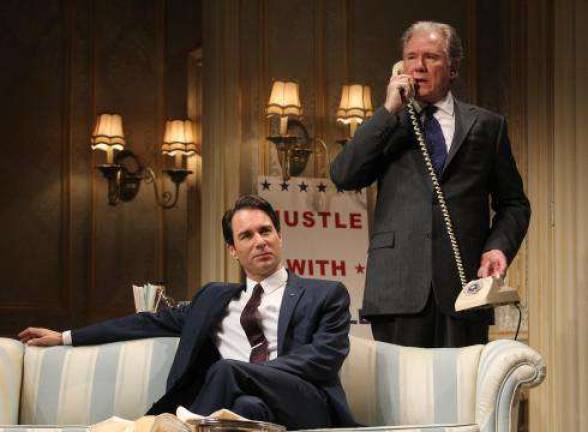Mud Brothers

Best Man boasts a smart ensemble By Doug Strassler The Best Man, Gore Vidal's moralistic chestnut, was written and set in 1960, running parallel with the Kennedy-Nixon presidential race. It's since been revived on Broadway twice; first in 2000, and again now in 2012. What might all these years have in common? Yep, they're election years! Timing might up the cache of this show, but the current revival, girded by a talented and starry ensemble with 13 Emmys and nine Tonys among them, proves that the show could be a winner any year. Michael Wilson's smartly-paced and well-designed show moves back and forth between the Philadelphia hotel suites belonging to two rival candidates: former Secretary of State William Russell (John Larroquette) and Senator Joseph Cantwell (Eric McCormack). Both are eager to receive the party of endorsement of ex-president Arthur "Artie" Hockstader (James Earl Jones) as well as Sue-Ellen Gamadge (Angela Lansbury), the powerful head of an anonymous women's organization. Candice Bergen plays Russell's wife, Alice, weary from a life of standing by her wayward man with a smile on her face, while Kerry Butler's Mabel Cantwell is a far more ambitious Southern belle. Hockstader's choice matters less than the ones others make while waiting for it. In Vidal's diagrammatic setup, everyone has something to lose, and both Cantwell and Russell eventually find the ammo they need against one another. Russell's no angel, but he's not quite as dirty as Cantwell. Will he compromise his beliefs and his legacy to further his career? It's to Larroquette's credit that we accept and come to sympathize with Russell, even if we're not sure we agree with steps he is willing to take and even though traces of arrogance remain throughout his self-righteous sermonizing. The actor grounds the show with his sharp elocution and charisma. McCormack, meanwhile, succeeds at walking a finer line. Cantwell is slick and phony, but not transparent, and McCormack's ability to communicate his aggressiveness without giving the game away is to be applauded. The women playing their wives fare less well. Alice is the heart of the show, but Bergen looks uncomfortably rigid on stage. It's only in her repartee with Larroquette that she softens and we begin to see what makes her tick. Butler, hidden behind an unconvincing and inarticulate Dixie accent, is an even bigger stretch, embellishing comic relief into caricature. As Cantwell's and Russell's campaign managers, Corey Brill and Michael McKean offer sharp turns, and Lansbury, Dakin Matthews and Jefferson Mays play their minor parts to the hilt. More than anyone, Jones has a field day as the authoritarian Hockstader, suggesting how virtue can be a vice of its own. The Best Man isn't riveting; Vidal's ideas are all ideals, and while evergreen, they're all familiar by now. He's preaching to the choir about the importance of being earnest, which stopped being news long before Oscar Wilde put pen to paper. But Wilson has mounted a mighty attractive campaign. You could make for a worse cabinet than the cast that makes Best the attractive draw that it is. Gore Vidal's The Best Man Gerald Schoenfeld Theatre, 236 W. 45th St. [www.thebestmanonbroadway.com](http://www.thebestmanonbroadway.com/). Through July 8.